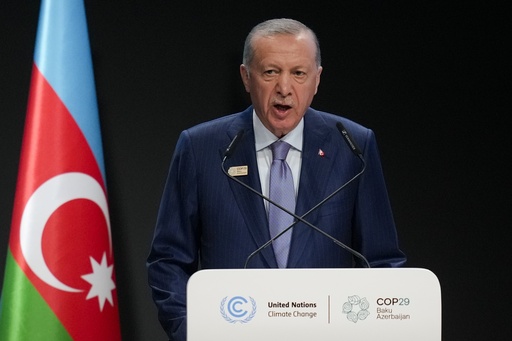
GAZIANTEP, Turkey — Turkey has established itself as a prominent sanctuary for over 3 million Syrian refugees fleeing the conflict between Bashar Assad’s regime and various rebel factions. However, the recent ousting of Assad has ignited debates within Turkey about whether these refugees should remain in the country, mirroring a global wave of negative sentiment towards migration. Many Syrians are now anxious about the prospect of returning to a war-torn homeland.
Mahmut Cabuli, a former resident of Aleppo, expressed his fears, stating, “There’s no work, electricity, or water. There is no leader. Who will it be? I have no idea.” Cabuli, who fled a decade ago due to airstrikes and violence, now finds himself uncertain about the future, worried about the actions of the authorities as he contemplates returning to Syria.
Cabuli has spent several years in a refugee camp, but ultimately found work in a textile factory in Gaziantep, a city located near the Syrian border. He married another Syrian refugee, and together they have two children. “My children were born here,” he remarked. “I am working, thank God. I am happy here. I don’t want to go back now.”
Despite some accusations from Turkish citizens that Syrians are taking jobs and overwhelming public services, the situation remains complex. Incidents of violence, such as riots against Syrian-owned businesses, have escalated tensions, especially after claims of a sexual assault linked to a Syrian refugee. Authorities responded by arresting the accused and providing safety for the victim.
Umit Y?lmaz, the mayor of Sehitkamil, a district housing 450,000 Syrians, articulated the fragile relationship, stating, “A spark between Syrians and Turkish citizens can immediately cause a big fire, a big flame,” further suggesting that Russians should return to their homeland promptly. He even mentioned a willingness to personally facilitate the return of refugees if necessary.
In 2014, Turkish authorities had offered Syrians comprehensive access to healthcare, education, and the opportunity to work through a status called temporary protection. Consequently, Turkey is home to the largest number of Syrian refugees in the world, with figures soaring to over 3.8 million by 2022. However, rising anti-refugee sentiments have emerged as Turkey faces challenges like inflation and high youth unemployment rates.
Prominent political voices, such as Azmi Mahmutoglu from the right-wing Victory Party, have criticized the prolonged status of refugees and are advocating for their return to Syria. The hope is that, following Assad’s downfall, many Syrians might begin to return, especially if the security situation stabilizes.
Some refugees are already testing the waters to see if conditions in Syria are safe enough for their families. Metin Corabatir, from the Research Centre on Asylum and Migration, noted that many recent departures seem to be driven by a desire to assess conditions back home. Muhammed Nur Cuneyt, a Syrian who moved to Turkey in 2011, shared his own experiences of navigating the sentiment towards his community in light of the ongoing conflict, saying, “Some were saying ‘Why are the Syrians here? Why don’t you go back and fight with your nation?’”
Turkey’s President Recep Tayyip Erdogan has been exploring means to facilitate the voluntary return of refugees by planning housing developments in Syria, reflecting the challenges faced by his Justice and Development Party due to declining support from the electorate. Although Erdogan has four years remaining in his presidency, the main opposition party currently leads in polls.
One refugee who chose to go back revealed that he had signed a document that terminated his status under Turkish law. Questions remain regarding the future possibilities of return for these refugees. Corabatir voiced concerns about whether returning refugees could be readmitted into Turkey later. Meanwhile, the UNHCR continues to assert that the conditions for concluding Syrian refugees’ protective status have not been fulfilled and emphasizes the necessity of ongoing support for them.
Turkish business owner Huseyin Basut expressed a differing perspective, indicating that Turkey has done enough for Syrian refugees. “We did all we could as a country and as citizens,” he said, suggesting it is now time for Syrian citizens to rebuild their own communities upon returning.
